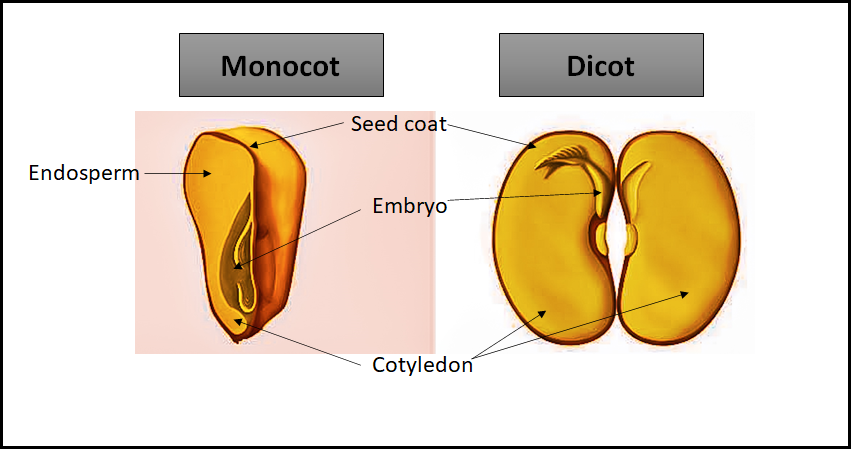
Mango is a monocot plant.
(a)True
(b)False
Answer
592.8k+ views
Hint: Monocots have parallel venation in leaves and they possess fibrous or adventitious roots whereas on the other hand dicots have reticulate venation and possess tap root.
Complete answer:
False, Mango is not a monocot plant. The scientific name of mango is Mangifera indica.
-It is a dicotyledonous plant because of the presence of two cotyledons in the seed of this plant. The ovules develop into seeds after fertilization. A seed comprises a seed coat and an embryo. Moreover, the embryo consists of an embryonal axis and one or two cotyledons.
-The leaves of Mango trees show reticulate venation and have a well-developed tap root system. Both these conditions occur in dicots.
Additional Information:
Structure of Dicotyledonous seed
-Seed coat: It is an outer tough covering of the seed. It develops from the integuments of the ovule. The seed coat possesses two layers, the outer one is testa and the inner one is known as tegmen. The hilum is a scar on the seed coat by which the growing seeds are bound to the fruit. Above the hilum is a tiny hole called the micropyle.
-Embryo: It is the most important part of the seed. It comprises an embryonal axis and two cotyledons. The cotyledons are often fleshy and full of reserve food materials, just like mango. At the two margins of the embryonal axis, there are the radicle and the plumule.
-Endosperm: It is formed as a result of double fertilization. In some seeds such as castor it is a food storing tissue. But in plants such as bean, gram, and pea, the endosperm is not present in mature seed. Such seeds are known as non-endospermous.

So, the correct answer is ‘False’.
Note: Dicots (Mango trees) are generally woody trees because of the secondary growth that takes place in them. Monocots are generally herbaceous due to an absence of secondary growth. Dicots are generally a kind of angiosperm plants that produce seeds.
Complete answer:
False, Mango is not a monocot plant. The scientific name of mango is Mangifera indica.
-It is a dicotyledonous plant because of the presence of two cotyledons in the seed of this plant. The ovules develop into seeds after fertilization. A seed comprises a seed coat and an embryo. Moreover, the embryo consists of an embryonal axis and one or two cotyledons.
-The leaves of Mango trees show reticulate venation and have a well-developed tap root system. Both these conditions occur in dicots.
Additional Information:
Structure of Dicotyledonous seed
-Seed coat: It is an outer tough covering of the seed. It develops from the integuments of the ovule. The seed coat possesses two layers, the outer one is testa and the inner one is known as tegmen. The hilum is a scar on the seed coat by which the growing seeds are bound to the fruit. Above the hilum is a tiny hole called the micropyle.
-Embryo: It is the most important part of the seed. It comprises an embryonal axis and two cotyledons. The cotyledons are often fleshy and full of reserve food materials, just like mango. At the two margins of the embryonal axis, there are the radicle and the plumule.
-Endosperm: It is formed as a result of double fertilization. In some seeds such as castor it is a food storing tissue. But in plants such as bean, gram, and pea, the endosperm is not present in mature seed. Such seeds are known as non-endospermous.

So, the correct answer is ‘False’.
Note: Dicots (Mango trees) are generally woody trees because of the secondary growth that takes place in them. Monocots are generally herbaceous due to an absence of secondary growth. Dicots are generally a kind of angiosperm plants that produce seeds.
Recently Updated Pages
Master Class 11 Computer Science: Engaging Questions & Answers for Success

Master Class 11 Business Studies: Engaging Questions & Answers for Success

Master Class 11 Economics: Engaging Questions & Answers for Success

Master Class 11 English: Engaging Questions & Answers for Success

Master Class 11 Maths: Engaging Questions & Answers for Success

Master Class 11 Biology: Engaging Questions & Answers for Success

Trending doubts
One Metric ton is equal to kg A 10000 B 1000 C 100 class 11 physics CBSE

There are 720 permutations of the digits 1 2 3 4 5 class 11 maths CBSE

Discuss the various forms of bacteria class 11 biology CBSE

Draw a diagram of a plant cell and label at least eight class 11 biology CBSE

State the laws of reflection of light

Explain zero factorial class 11 maths CBSE




